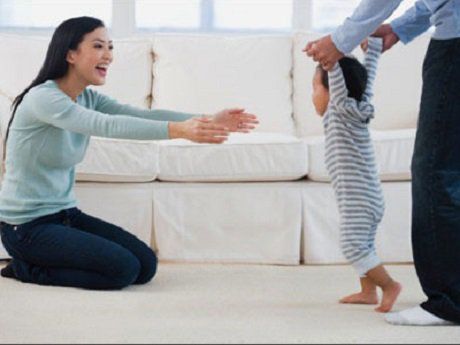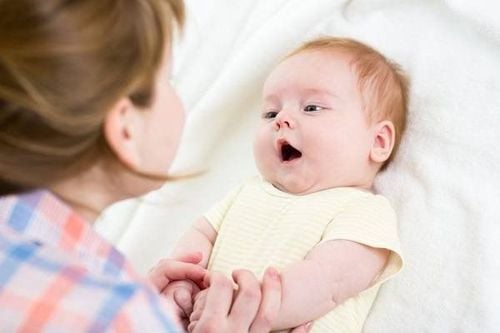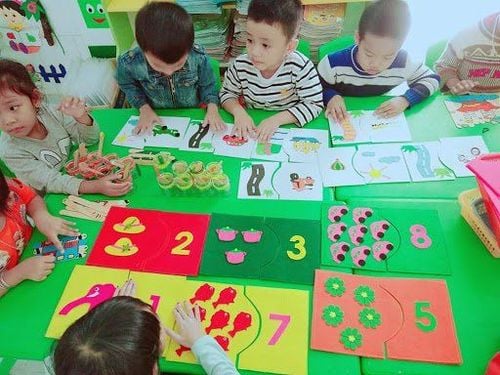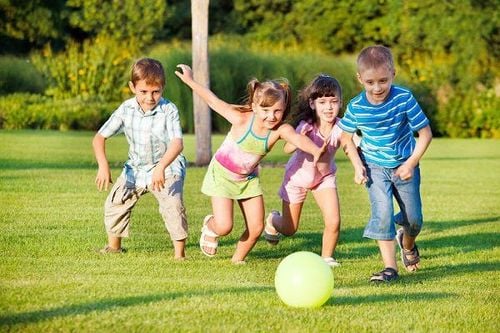This is an automatically translated article.
Empathy is when a person is able to put themselves in another person's shoes and feel what that person is going through. This is a complex emotion, it takes time to understand. However, some children can begin to understand other people's thoughts and feelings as early as 18-24 months. After this period of time, you can begin to teach your child to empathize with others in everyday life.1. How does the child know how to empathize?
Empathy is the ability to imagine how another person would feel in a particular situation and react with caution. This is a very complex skill, it takes a long time for children to pick up this skill. Being able to empathize with others means being a child:The child understands that the child is a separate individual, his or her own person; Children understand that other people may have different thoughts and feelings than they do. Children record common feelings that most people experience such as: happiness, surprise, anger, disappointment, sadness, etc. Children can look at a specific situation like looking at a friend. peers say goodbye to their parents at daycare, and imagine how the child might feel about that friend in that moment. Children can imagine what response might be appropriate or comforting in that particular situation, such as giving a friend a favorite toy or teddy bear to comfort you. Understanding and showing empathy is the result of many social-emotional skills that develop during the early years of a child's life. Some particularly important milestones include:
Establishing a safe, strong, loving relationship with you is one of your child's first major milestones. Feeling accepted and understood by you will help your child learn to accept and understand others as they grow up. 6-month-old babies begin to ask questions from people they come into contact with. This is when a baby will look to parents or other loved ones to gauge their reaction to a real person or situation. For example, a 7-month-old baby looks at his father carefully as he greets a visitor to their home to see if the new person is fine and safe. A parent's reaction to a guest will influence how the baby reacts to that guest. This is also why parents are encouraged to be optimistic and reassured, not to appear nervous when saying goodbye to their children at daycare. Because it sends the message that “this is a good place” and “you will be fine”. Learning from parents' reactions to new situations helps children understand the world and the people around them. Between the ages of 18 and 24 months, toddlers will develop a lot mentally. This is when toddlers first realize that, like children, they have their own thoughts, feelings, and goals. Other people also have their own thoughts and ideas, and these may differ from your child's. At this age, toddlers will begin to recognize themselves in the mirror. This signals that a child has come to know himself as a separate person.

Sự đồng cảm là kết quả của nhiều kỹ năng xã hội - tình cảm đang phát triển trong những năm đầu đời của trẻ
2. When can children be taught to empathize with others?
Humans are inherently empathetic, at least to some extent. Research shows that when one child in daycare cries, the other children who cry with them tend to grow up to be the most empathetic. Some children can begin to understand more about the thoughts and feelings of others between 18 months and 24 months of age. After this age, you can gradually teach your child to become more aware of the feelings of others in everyday life.However, don't expect too much from the child at first. It will be a slow and gradual journey for children to understand that other people have their own feelings too and that their feelings are important.
As any parent knows, 2-year-olds are not the epitome of altruistic and generous behavior. “Children don’t develop the ability to understand empathy,” says Jane Nelsen, a child therapist and co-author of Positive Discipline for Preschoolers. But that doesn't mean you shouldn't continue to teach your child to empathize with others. For example, if your 2-year-old hits his younger brother, you might say, 'I hurt when you hit me. Do you feel that feeling?
3. Teach children to be empathetic
3.1. Talking about feelings
You need to start by naming your child's behavior so that he or she can recognize emotions. Say, "Oh, you're so kind" when your child kisses your injured finger. Children will learn from your responses that their responses are recognized and appreciated.Children also need to recognize negative emotions, so don't be afraid to calmly point out when your child is less concerned. Try saying, "It makes my brother really sad when he grabs his rattle. Is there anything I can do to help him feel better?".

Bạn cần bắt đầu bằng cách đặt tên cho hành vi của trẻ để trẻ có thể nhận ra cảm xúc
3.2.Praise the child's empathetic behavior
When your child performs an act of kindness, tell her what she did right and say as specifically as possible: "You were so generous in sharing your teddy bear with your little sister! I'm happy. See how I'm smiling?"3.3.Encourage children to talk about their feelings and those of others
Let your child know that you care about his or her feelings by listening attentively. Look your child in the eye when he talks to you and paraphrase what he says. When your child screams, "Hooray!", you can say back, "Oh, I feel so happy today." Your child may not know how to respond if you ask him why, but he or she will have no problem talking about "feeling happy".Similarly, share your own feelings with your child: "I feel sad when you hit me. Think of another way you can tell me that you don't want to wear the shoes. there". Children will learn that their actions affect others, which is also a difficult concept for young children to understand.
3.4.Indicate empathetic behavior of others
Teach your child to notice when others are behaving nicely. Try saying to your child, "Remember that woman at the grocery store who helped us pick up our food when we dropped our bag. She was really nice to us and she made me. I feel better when I'm upset." In this way, you strengthen your child's understanding of how people's actions can affect other people's feelings.Some books also provide good examples of empathy, so ask your child how the puppy lost in one story is feeling or why the girl in another is smiling. laugh. Let your child know how you would feel if you were one of those characters and ask how he would react. These discussions will help children learn about other people's feelings and relate them to their own.
3.5.Teach the basic rules of politeness
The way you behave is a concrete way for children to show care and respect for others. As soon as babies can communicate verbally, you can start saying "please" and "thank you". Explain that you tend to help your child more when he is polite to you and that you are not happy when he gives you orders.Of course, being polite to children is worth a thousand rules and explanations. Say "please" and "thank you" often to your child and to others, and your child will learn that these phrases are part of normal communication, both at home and in public.
3.6. Don't use anger to control your child
While it's easy to get upset when a child hits your younger brother, try not to use anger as a tool to manage your child's behavior. Teaching children by guiding and by example is much more effective, especially at this age.Jerry L. Wyckoff, psychologist and co-author of Twenty Teachable Virtues says, “When you talk, I'm really mad at you,” kids shut up and withdraw. Instead, show your child empathy. Instead of getting angry, take a moment to calm down. Then say firmly to your child, "I know you're mad, but you shouldn't hit your brother. It hurt him and it made me sad. Tell him. excuse me."
3.7. Give children small chores
Research shows that kids who learn responsibility also learn forgiveness and caring. 2-year-olds enjoy doing small tasks, and some chores, such as feeding pets, teach empathy especially well, especially when you give lots of praise for a job well done. .3.8. Set a good example for children about empathy
Acts of kindness and charity are a great way to teach children empathy. Bring your child with you when you prepare meals for an ailing neighbor or a friend with a new baby. Let your child help you pack clothes to take to your local charity. You can explain very simply that sometimes people get sick or don't have enough food or clothes and so they need the help of those around them.
Hành động tử tế và từ thiện là một cách tuyệt vời để dạy trẻ sự đồng cảm
4. If your child doesn't empathize, should you worry?
It is completely normal for children to be self-centered at times. A child's brain is still developing and not mature enough to fully realize the impact a child's words and actions can have on others.If you are concerned that your child never shows empathy or doesn't seem to be aware that other people's feelings are different from yours, you may want to talk to your doctor for reassurance and advice. useful. Children will most likely become more aware of the feelings of others naturally, as they mature, but you will never get a second chance to teach them empathy.
Nurturing children's emotions is necessary, however, children in the developmental stage are also prone to respiratory problems, respiratory infections, skin diseases and infections. gastrointestinal tract ... parents need to pay special attention to the care and provision of adequate nutrition for children.
For children to be healthy and develop well, it is necessary to have a nutritious diet in terms of quantity and quality balance. If children are not provided with adequate and balanced nutrients, it will lead to diseases of excess or lack of nutrients, which adversely affect the comprehensive development of children in terms of physical, mental and motor skills.
Parents should supplement their children with supportive products containing lysine, essential micro-minerals and vitamins such as zinc, chromium, selenium, and B vitamins to help fully meet their child's nutritional needs. At the same time, these essential vitamins also support digestion, enhance nutrient absorption, help improve anorexia, and help children eat well.
Parents can learn more:
Signs of zinc deficiency in children
Micronutrient deficiency and failure to gain weight in children
Please regularly visit Vinmec.com website and update useful information to take care of your child. Take care of the baby and the whole family.
References: babycenter.com, zerotothree.org, babycentre.co.uk













